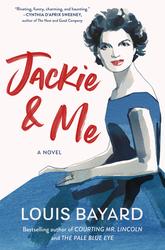
|
|
| Louis Bayard | |
Louis Bayard is the author of 10 novels, including Courting Mr. Lincoln and The Pale Blue Eye, which is being made into a Netflix movie. His novel Jackie and Me (Algonquin, $28, reviewed in this issue) is a fictionalized account of the relationship between Lem Billings, longtime close friend to John F. Kennedy and the Kennedy family, and the young journalist (and future political wife) Jacqueline Bouvier.
How did you decide to take this angle on Jackie's story?
It didn't start with Jackie; it started with Lem. It started with a cover of Princeton's alumni magazine featuring a picture of two undergrads from the 1930s, and the taller one had his arm wrapped around the smaller one. My first thought was that they'd uncovered this closeted gay world at Princeton, decades before Stonewall. But then I realized the smaller man was John F. Kennedy.
I wondered: If that's JFK, who is that? And that's how I learned about Lem Billings, who was Jack's best friend from high school to the end of Jack's life. He prided himself on being a Kennedy insider. What a privileged vantage point he had on the Kennedy dynasty, on Jack's political career--on all of it. I thought Lem would make a fascinating narrator, since (among other things) he was apparently great fun. And he was a closeted gay man, so I thought he would have entertainingly WASPish things to say about people.
I later found another picture of Lem and Jack from the 1950s--between them, in the middle, is young Jackie Bouvier. Lem is drawing Jackie away from Jack in a protective manner; some joke is passing between them. Lem was there when Jack and Jackie became a team, or a tandem, or whatever they became. He had a privileged vantage point on that relationship, too.
Lem is both an insider and an outsider to the Kennedys: they love him, keep him around, but he's never truly one of them.
He's an outsider in the sense that he, like Jackie, came from an old family, but he didn't have that level of wealth. He was never going to be completely part of their world, but he was privy to so much of what was going on. And there was absolute trust from the Kennedys that Lem would never betray them or embarrass them in any way.
Usually, when he was asked about these things, he would say, "I can't imagine any better life than being Jack Kennedy's best friend." He was part of the inner circle. He had his own room at the White House. He was the guy that Jack could turn to for a game of backgammon, or the release that a best friend provides. He was proud of that, and he was also proud of the fact that he never asked the Kennedys for money. He was proud of his career in advertising.
I find Lem such an interesting figure. He's someone who hasn't really been talked about. There's a useful nonfiction book [about him], but I felt--as I often do--that this could be usefully fictionalized. I love history; I love the challenge of reanimating these lost worlds. I also had in mind The Remains of the Day, which involves a servant looking back on the master he's been serving all these years, and reckoning with the cost of that to his life, and his own hopes and dreams.
 Lem narrates his story partially in flashbacks. How did you find it effective to tell the story in 1981 and also in the 1950s?
Lem narrates his story partially in flashbacks. How did you find it effective to tell the story in 1981 and also in the 1950s?
1981 is Lem's last year on earth. Reagan is [in the White House] as a kind of rebuke of the whole Kennedy legacy of liberalism and progressivism. It's before AIDS, but the gay movement is coming out of the closet; it's walking in the streets, and it's something that a gay man of Lem's generation wouldn't be comfortable with. There's a younger generation, a less apologetic generation, that's ready to name themselves and demand a place at the table. Lem grew up in a different era, when you could get arrested--when your whole career could be torpedoed--if you were found out. It was a world of hiding, and terror. It would have been difficult for him to put all that aside.
Jackie is an interesting character--she's so well known, but also an enigma.
We get a sense of Jackie's point of view [in the story] when she's living with her mother or going up to New York. There's always something we don't know about her, and maybe that's why she's endlessly interesting. Jackie had that same charismatic enigma, a quality like Greta Garbo.
She was very much a career girl. She won this prestigious Prix de Paris scholarship, and it didn't work out, but she immediately wangled this job [as a Camera Girl]. This was a training ground for the charisma she would later display on the political scene and the social scene. She had said her ambition was "not to be a housewife." But another part of her wanted security. She was working on two opposed tracks. It was hard for her to settle down in either direction. That's what makes her interesting to me.
Part of the frustration was that Jack himself didn't want to be married. He liked being a bachelor; he liked his free rein with the ladies. [Marriage] began as a political calculation on his part, forced upon him by his father and his family. Over time, he came to see and value the qualities Jackie had.
It's clear that Jackie and Lem both love Jack. Do you think they love him in different ways? The same way?
It's not always clear. Lem was willing to do whatever Jack wanted to do, and to be there for him whenever Jack wanted him to be there. As for Jack, his emotional relationships were usually with male friends. For him, women were mostly sex objects--or decorative. He didn't really have close relationships with women.
Jackie wound up repeating the same mistake her mother had made: marrying a man who had no intention of being faithful to her. She struggled with the isolation, the extramarital dalliances, the attention. I think if she had come along 20 years later, she could have had a different life. She was ambitious and political, and the only way she could realize that ambition was to marry a politician. And it's a tough life to be a political spouse. You have to subordinate your own inclinations, your own ambitions, your own dreams. Especially then--though it's even true now. --Katie Noah Gibson, blogger at Cakes, Tea and Dreams

